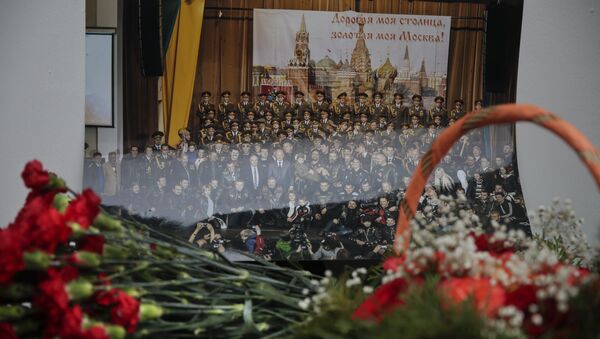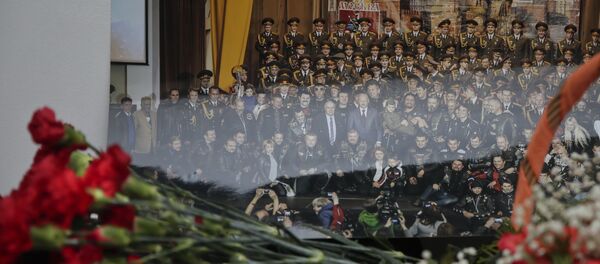On Sunday, a Russian Tu-154 aircraft set for Syria crashed in the Black Sea near Sochi coast with all 92 people aboard, including 64 members of Alexandrov Ensemble, the official choir of the Russian armed forces, being killed in the crash.
"They were accepted as great artists. And the fact that they worn uniform… nobody was ever paying attention to this. Alexandrov choir united everyone and everything, they carried in the first place the great Russian culture. They did not carry any policy, they carried an art, it is the most important, and they were and are loved for it," Skulski, who organized more than 200 concerts of the famous Russian army choir in Poland in the last 13 years, claimed.
He said that over half a million of spectators had visited the Alexandrov Ensemble's concerts in Poland during more than a decade with some people coming to their performances a dozen times in a row.
"This tragedy has been on everybody's lips all over Poland, this tragedy has touched the Poles. In Poland, there is no such a person who would not know what a chorus of Alexandrov is. Even a rustic person knows who they are. After this tragedy, can you accept it just as a routine information?! No!" Skuski, who has developed personal and friendly relations with many member of the choir, asserted.
He added that the day the sad news came he had received almost hundred telephone calls from Poles asking him what happened to Russian artists and expressing their sympathy.
The Alexandrov Ensemble repeatedly visited Poland in communist times, but after the fall of communism there was a long break in their concerts with one small exception when some 50 members of the choir — in contrast to usual number of 120-130 artists — gave a short performance in Poland, without the participation of the ballet dancers.
The Academic Ensemble of Song and Dance of the Russian Army named after A.V. Aleksandrov, Russia’s biggest military and folk music ensemble, known worldwide as Red Army Choir, was created in 1928. It is often perceived as a vivid symbol of Soviet era and Russia's current supposed militarism thus reception of its artists in some countries is not always very warm.
"When after many years of break they came [to Poland] for the first time in 2003, I saw them coming out of the airplane with eyes set on the floor, and I couldn't help thinking what was wrong with them. It turned out that they were put into a fright before departure — they were told not to leave the stage even if the Poles would throw eggs and tomatoes into them," the Polish impresario recalled with laughter.
"The concert in Washington was attended by over a hundred of the US senators. No such event saw such a number of senators before. One senator told me this himself, otherwise I wouldn't have known," Skulski stated.
Most known songs performed by the choir in Poland were "Kalinka," "Victory Day," "Smuglyanka" and "Rustling Weeping Willows" — a song of Polish partisans sang to the tune of Russian patriotic march "Farewell of Slavyanka." Some songs were sung in the Polish language, like "The Red Poppies on Monte Cassino," one of the best-known Polish military songs of World War II, or "Brunettes, Blondes," made famous to public by late Polish singer and artist Jan Kiepura.
"Whatever they sang from their repertoire, all the songs had a warm appeal and applause. What concrete song they sang wasn't the most important, it was rather their performance itself," Skulski said.
He argued that the choir that was planning to come to Poland again next year would surely be reborn "like a phoenix from the ashes," after the tragic death of its 64 members in the plane crash.
"It is not just the Russian tragedy, it is a tragedy for the whole world," he stressed.






